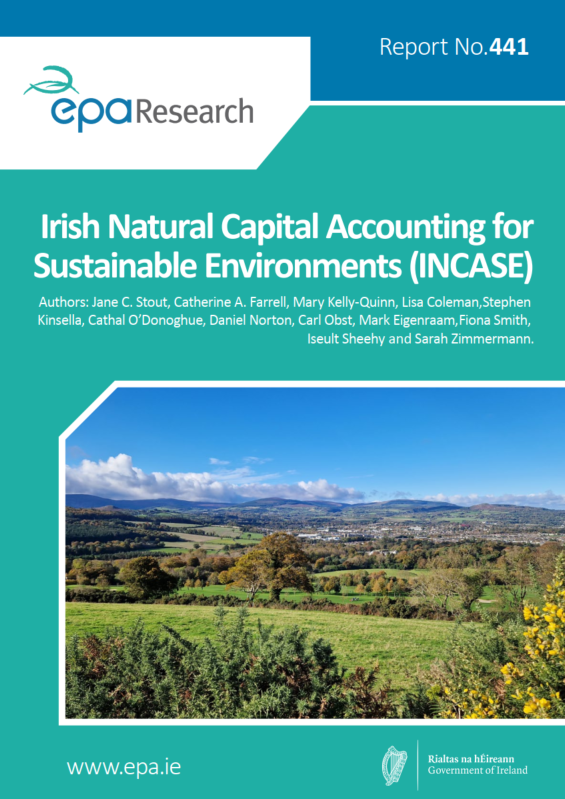Research 441: Irish Natural Capital Accounting for Sustainable Environments (INCASE)
Authors: Jane C. Stout, Catherine A. Farrell, Mary Kelly-Quinn, Lisa Coleman,Stephen Kinsella, Cathal O’Donoghue, Daniel Norton, Carl Obst, Mark Eigenraam,Fiona Smith, Iseult Sheehy and Sarah Zimmermann.
Summary: Nature continues to be degraded globally. Despite our societies and economies depending on it, we often ignore or undervalue this degradation. To bring nature into everyday decision-making, the natural capital approach deliberately uses the language of business and economics. In this context, nature can be thought of as an array of stocks of natural assets, incorporating biodiversity, air, water and geology. The condition of these stocks influences the flow of goods and services, and the benefits that our societies and economies derive from these assets. This EPA Research Report provides insights into the development of natural capital accounts at the catchment scale in Ireland. It aims to provide a comprehensive view of the stocks of natural capital assets and the flows of services, along with guidance on how to scale-up the process to national level.

Project Highlights
Identifying Pressures
Nature continues to be degraded globally. Despite our societies and economies depending on it, we often ignore or undervalue this degradation. To bring nature into everyday decision-making, the natural capital approach deliberately uses the language of business and economics. In this context, nature can be thought of as an array of stocks of natural assets, incorporating biodiversity, air, water and geology. The condition of these stocks influences the flow of goods and services, and the benefits that our societies and economies derive from these assets.
To identify and manage risk of environmental degradation to human economies, Natural Capital Accounting provides a framework to track changes in the extent and condition of stocks of assets, and in the flows of services over time. This enables prioritisation and appropriate management of natural assets and the multiple benefits they provide to people, and valuation of assets in holistic terms.
There are several potential approaches to Natural Capital Accounting, which can be implemented at various scales. What would work in an Irish context was not immediately clear. In addition, there was little knowledge and awareness of Natural Capital Accounting in Ireland, or how it could be applied to sustainable management of Irish natural assets. These were the challenges that the INCASE project addressed.
Informing policy
Developing Natural Capital Accounting approaches meets several policy objectives, linking natural and socio-economic systems. Integrating ecosystems and biodiversity into national and local planning, development processes and poverty reduction strategies, and accounts, is one of the Sustainable Development Goals. In addition, protecting ecosystems and biodiversity are key policy targets in the EU’s Biodiversity Strategy for 2030 and the European Green Deal.
We tested the System of Environmental Economic Accounting – Ecosystem Accounting (SEEA-EA), a type of Natural Capital Accounting, at catchment scale in Ireland for the first time. Adopted by the United Nations in 2021 as the primary tool to integrate nature into national accounts, the SEEA-EA takes a spatial approach. It can be used by public bodies, businesses or landowners, at any scale, to map natural stocks such as forests, waterways and other habitats, and the flow of services from these stocks.
We built natural capital (ecosystem and geosystem) accounts for four Irish sub-catchments, focusing on extent, condition and services accounts. This involved accessing a wide variety of Irish data sources, over 200 datasets in all, from more than 30 agencies. This process highlighted the need for engagement with and collaboration across a range of data providers in Ireland, and the need for regular and reliable data collection. Outlining clear processes to build the accounts provided valuable insights into how to scale up to national level and apply the outputs for more informed decision-making by policymakers, land owners and managers, and other stakeholders. Natural Capital Accounting links natural and socio-economic data, and can provide evidence for investments in rural development, health and much more.
Developing solutions
Since the initiation of the INCASE project, there has been significant international progress in implementing the SEEA-EA accounting approach as a complementary metric to GDP, and there has been increased appreciation of the risks associated with biodiversity and ecosystem service loss. Thus, there is a need to benchmark natural capital stocks and flows over time, and our work has moved from the theoretical research sphere, and prototyping, to implementation by official statistics bodies.
We have the following recommendations:
• Developing and using ecosystem accounting is a national priority and requires investment in expertise and shared nature data infrastructure in Ireland.
• A detailed, high-resolution, regularly updated ecosystem map is required, and ecosystem condition assessment needs further development.
• The relationship between extent and condition of natural capital assets and flows of services and benefits requires more nuanced understanding.
• Ecosystem service assessment needs a standardised approach.
• A centralised data platform is required.
• Not all accounts can or should be monetised – but accounting for the diverse values of nature, including the inspiration it provides, is vital to the wellbeing of our society.
https://www.epa.ie/media/epa-2020/research/research-publications/Screenshot-2023-11-13-154728.png